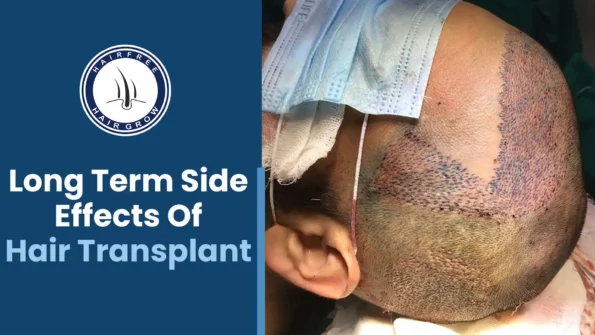Hair transplants have become increasingly popular over the years as a solution for hair loss. While the procedure promises to restore hair and confidence, it’s essential to understand the potential long-term side effects of hair transplant that may arise. Let’s delve into what you should know about these effects and how to manage them.
What is a Hair Transplant?
A hair transplant is a surgical procedure that involves moving hair follicles from one part of the body (the donor site) to the balding or thinning area (the recipient site). This procedure is typically performed on the scalp but can also be done on other parts of the body.
Types of Hair Transplant Procedures
There are two primary methods of hair transplantation: Follicular Unit Transplantation (FUT) and Follicular Unit Extraction (FUE). FUT involves removing a strip of scalp from the donor area, while FUE involves harvesting individual hair follicles directly from the scalp.
Short-Term Side Effects of Hair Transplants
While short-term side effects such as pain, swelling, and itching are common after a hair transplant, they usually subside within a few weeks. However, it’s the long-term effects that patients should be aware of.
Long-Term Side Effects of Hair Transplants
Risk of infection
One of the most significant long-term risks associated with hair transplants is the potential for infection. Although rare, infections can occur weeks or even months after the procedure, leading to complications and affecting the overall outcome of the transplant.
Scarring
Scarring is another concern with hair transplants, particularly with the FUT method. The linear scar left behind from the donor area may be visible if the hair is cut short, causing aesthetic concerns for some patients.
Hair loss shock
Some patients may experience a phenomenon known as “shock loss,” where the transplanted hair falls out temporarily before regrowing. While this is a normal part of the healing process, it can be alarming for patients who are unaware of this possibility.
Complications from Anesthesia
Like any surgical procedure, hair transplants carry risks associated with anesthesia, including allergic reactions and adverse side effects. While rare, these complications can have long-lasting effects on the patient’s health.
Psychological Effects
In addition to physical side effects, hair transplants can also have psychological implications for patients.
Emotional Impact
Hair loss can take a toll on a person’s self-esteem and confidence. While a successful hair transplant can boost self-confidence, unsuccessful outcomes or complications may exacerbate feelings of insecurity and dissatisfaction.
Body Image Concerns
Some patients may develop body image concerns following a hair transplant, especially if they are dissatisfied with the results or experience noticeable scarring. These concerns can affect various aspects of their lives, including relationships and career opportunities.
Depression and Anxiety
For some individuals, the stress of undergoing a hair transplant and the pressure to achieve desired results can contribute to feelings of depression and anxiety. It’s essential for patients to prioritize their mental health throughout the process.
Managing Long-Term Side Effects
While long-term side effects of hair transplants are a concern, there are steps patients can take to minimize their risk and manage any complications that arise.
Proper Aftercare
Following the post-operative care instructions provided by the surgeon is crucial for reducing the risk of infection and promoting proper healing. This includes keeping the scalp clean, avoiding strenuous activities, and taking prescribed medications as directed.
Consultation with a Dermatologist
If patients experience any concerning symptoms or complications after a hair transplant, it’s essential to seek medical attention promptly. A dermatologist or hair restoration specialist can evaluate the situation and recommend appropriate treatments to address any issues.
Potential Treatments
In some cases, additional treatments or procedures may be necessary to address long-term side effects of hair transplants, such as scar revision surgery or medication for infection. Patients should discuss their concerns and treatment options with their healthcare provider.
Conclusion
While hair transplants can be an effective solution for hair loss, it’s essential for patients to be aware of the potential long-term side effects associated with the procedure. By understanding these risks and taking proactive steps to manage them, patients can achieve successful outcomes and maintain their overall well-being.
Written By
MD (Skin & VD)
Dr. Richa Sanmukhani specializes in Long Term Side Effects of Hair Transplant, offering expert advice to educate patients on potential risks and benefits. Her patient-centered approach ensures informed decisions and promotes healthy, lasting results in hair restoration.
Disclaimer
We’ve made all possible efforts to ensure that the information provided here is accurate, up-to-date and complete, however, it should not be treated as a substitute for professional medical advice, diagnosis or treatment. See Detailed Disclaimers Here.


